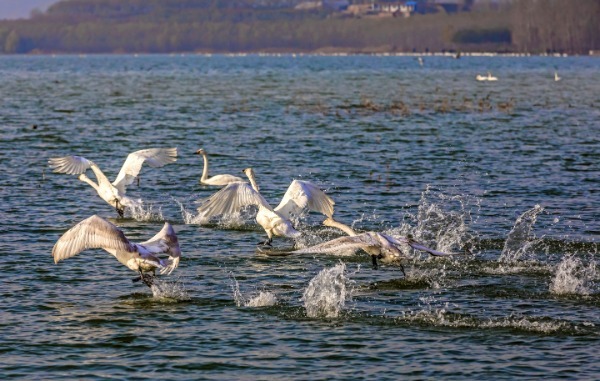 |
|
Swans fly over the water at the Yellow River Wetland in Pinglu county, Shanxi province, on March 1. It is one of the biggest sites for swans migrating from Siberia for the winter.[Photo/Xinhua] |
TAIYUAN-Spring is in the air. Tens of thousands of swans are leaving their winter homes in China and flying back to Siberia.
Local authorities in China's regions along the swans' migration route have pledged a harsh punishment for poaching and arranged special personnel to safeguard the birds on their return to Siberia.
Swans are listed as a national second-level protected animal in China and a globally vulnerable species. According to Zhang Longsheng, a senior engineer with the Shanxi provincial forestry and grassland bureau, there are three main migration routes for Siberian swans flying to China, with the middle route passing through Mongolia to northern and central China.
"Over 20,000 swans migrate from Siberia to China annually. The Yellow River Wetland is their largest migration site, attracting more than half the population every winter," Zhang says.
Located between Pinglu county of Shanxi province, and the city of Sanmenxia in Henan province, the Yellow River Wetland has an area of 2.8 million hectares, and plays an important role in protecting water sources and purifying water quality in northern China.
"Swans started to hibernate here in the 1980s, and the number has grown from 2,000 to 12,000 over the years," says Yang Yunge, head of the wildlife conservation station of Pinglu.
In 2012, Pinglu was named "China's Swan County" by the China Wildlife Conservation Association. In order to protect the species, Pinglu has shut down all polluting enterprises around the wetland, invested tens of millions of US dollars to improve the environment and established a conservation team with some 100 people as well as installing a video surveillance system.
"It is our responsibility to protect these swans. They are both part of the natural ecology and our happy life," says He Jianxi, who has been a ranger for more than 10 years in the Pinglu Yellow River Wetland Reserve. For the past few months, he has been feeding them corn and cabbage weighing over 100 metric tons.